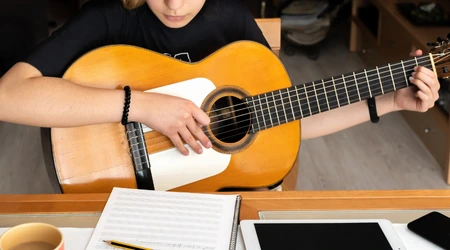How to Use Free Apps to Help You Study Music

Today, free apps to help you study music are revolutionizing the way we practice theory, tuning, rhythm and even composition.
Advertisements
Whether for beginners or experienced musicians looking to improve, technology offers affordable and efficient solutions.
In recent years, the adoption of these tools has grown exponentially. A survey by Music & Science (2024) showed that 81% of music students use at least one app as part of their training.
And the best part: many of them don't require a financial investment, just discipline and a mobile device.
But how do you choose the best apps and use them strategically? Which features should you prioritize to accelerate learning?
Advertisements
And how can you integrate them into your study routine without losing the practical essence of music?
This guide explores the best free options available in 2025, with practical tips, real-world examples, and proven data.
If you want to improve without spending a fortune on equipment or private lessons, keep reading.
1. Music Theory: Master the Fundamentals Without Leaving Home
Understanding scales, chords, intervals, and harmonies is the foundation for any musician. Previously, this required dense books and in-person lessons.
Now, free apps to help you study music make the process interactive and even fun.
THE Perfect Ear, for example, offers personalized exercises from beginner to advanced levels. It uses voice recognition to correct intonation and memory games to reinforce concepts.
A guitar student can, in just a few weeks, identify major and minor chords by sound alone – something that previously took months.
Already the Tenuto It's ideal for those who need to practice reading sheet music. With dynamic exercises, it adjusts the difficulty based on the user's progress.
Imagine a virtual teacher who never loses patience and is available 24 hours a day.
And it's not just instrumentalists who benefit. Singers can use the Functional Ear Trainer to develop absolute pitch, recognizing notes and intervals accurately.
++Caxambu and Candongueiro: Discover the Rhythms of Black Culture in Minas Gerais
Apps like these transform theory, once considered dry, into an engaging experience.
2. Perfect Tuning on Any Instrument
Nothing frustrates a musician more than an out-of-tune instrument. Digital tuners have been around for years, but free apps to help you study music have evolved far beyond the basics.
THE Tuner T1 not only tunes guitars and violins, but also detects microtones, essential for styles such as blues and Arabic music.
It even offers accuracy histograms, showing whether the note is slightly above or below ideal.
++How to Read Rhythmic Notation Even Without Knowing Sheet Music
For wind instruments, the Bandmate Tuner is an excellent option. It allows you to adjust the pitch according to the chosen pitch (440Hz or other standards) and even includes a built-in metronome.
And if the problem is relative tuning (the ability to adjust the strings in relation to each other), the GuitarTuna has a special mode for that.
Just tune the first string, and the app guides you through tuning the rest based on harmonics.
3. Rhythm: The Foundation of Music

A musician with impeccable technique but no sense of rhythm sounds like a car without wheels.
Fortunately, the free apps to help you study music include powerful tools for developing timing and accuracy.
THE Soundbrenner goes beyond the traditional metronome. It syncs with smartwatches and wristbands, vibrating on the user's wrist to internalize the beat.
Ideal for drummers who need to maintain the groove even in complex tempos.
++Learn to Read Sheet Music Without Complications
Already the Pro Metronome allows you to create personalized rhythms, with subdivisions in triplets, syncopations and even irregular time signatures (5/4, 7/8).
You can simulate the beat of a specific song and practice along, gradually adjusting the speed.
And for those who study African or Latin percussion, the PolyRhythm is indispensable. It allows you to practice polyrhythms, such as playing 3 against 2 or 4 against 5, something that previously required a specialized teacher.
4. Improvisation and Composition: Unlimited Creative Freedom
Many musicians get stuck when creating because they don't know where to start. free apps to help you study music now include tools that stimulate creativity.
THE BandLab is a complete virtual studio. It lets you record multiple tracks, apply effects, and even collaborate with other musicians online.
A real-life example: Maria, an amateur pianist from Rio de Janeiro, composed her first original song using only her cell phone's microphone and the loops available in the app.
Already the iReal Pro It's a dream for anyone who wants to practice improvisation. It generates automatic accompaniments in different styles (jazz, bossa nova, pop) and allows you to transpose to any key.
You can play a sax solo over a chord progression without needing a backing band.
And for composers in need of melodic inspiration, the Chordana Composer suggests harmonies based on AI algorithms, learning from your personal style over time.
5. The Future of Music Learning: Augmented Reality and Personalization

Technology never stops evolving, and free apps to help you study music are at the forefront.
THE Yousician, for example, already uses augmented reality to project chords directly onto the guitar neck, guiding finger positioning in real time.
Another trend is personalization through AI. Apps like Melodics analyze your performance and adapt exercises to address specific weaknesses.
It's like having a teacher who knows your difficulties and adjusts the lessons daily.
And with the integration of wearables, we'll soon see apps that monitor posture, finger pressure, and even breathing—turning every study session into a highly efficient class.
6. Personalized Learning: Apps that Adapt to Your Level
One of the greatest advances in free apps to help you study music is the ability to customize.
Tools like Melodics use AI algorithms to analyze your performance in real time, identifying error patterns and suggesting specific exercises to overcome difficulties.
For example, if you always miss the transition between C and G chords on the guitar, the app can create a drill sequence focused on that exact movement.
This adaptive approach replicates the experience of a private tutor, but with the advantage of 24/7 availability.
Research of the Berlin Institute of Music Technology (2024) show that students using apps with personalized AI progress 40% faster than with traditional methods.
Conclusion: Music Within Everyone's Reach
You free apps to help you study music are democratizing access to musical knowledge.
They are not a substitute for the guidance of a good teacher, but they serve as powerful supplements, especially for those on a budget.
Whether you're tuning a guitar, practicing perfect pitch, composing a song, or mastering complex rhythms, there's a free app that can help.
The key is to choose the right tools and use them consistently.
How about trying one today and seeing the difference in your progress?
Frequently Asked Questions
1. Do these apps really work for beginners?
Yes! Many apps have beginner modes with step-by-step tutorials. Simply Piano, for example, starts by teaching the basic notes before progressing to complete songs.
2. Can I use these apps without internet?
Most work offline, but some features (like playlist updates or online collaboration) require an internet connection.
3. What is the best app for ear training?
THE Functional Ear Trainer and the Perfect Ear are excellent options, depending on your level.
